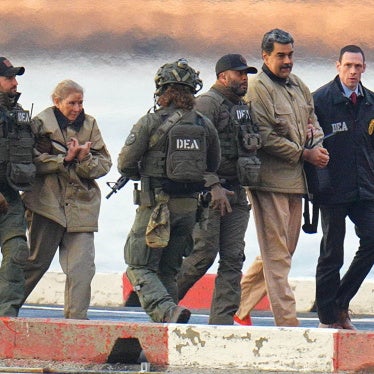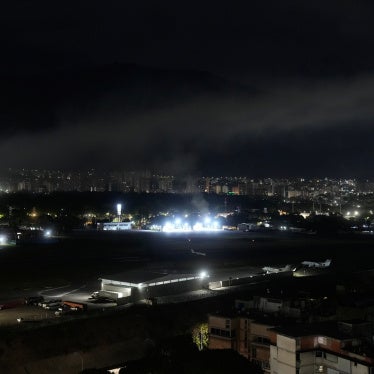(Washington, D.C.) – Venezuelan authorities should investigate the violence during demonstrations across the country on February 12, 2014 promptly and impartially, Human Rights Watch said today. Investigations should not be used as a pretext for prosecuting political opponents or limiting free speech.
At least three demonstrators were killed and more than 60 others injured during clashes with security forces. Senior government officials blamed the opposition leader, Leopoldo López, for the killings, and a Caracas judge issued an arrest warrant for him, local media reported. The international cable news channel NTN24 was taken off the air in the afternoon in response to its coverage of the protests, the station reported.
“What Venezuela urgently needs is for these killings to be investigated and the killers brought to justice, no matter their political affiliation,” said José Miguel Vivanco, Americas director at Human Rights Watch. “What Venezuela does not need is authorities scapegoating political opponents or shutting down news outlets whose coverage they don’t like.”
Students and opposition groups organized more than a dozen demonstrations throughout the country on February 12 to protest the detention of students during marches in previous days. Several of the February 12 protests ended with violent incidents, news accounts said. The local human rights group Provea reported that security forces had used firearms and tear gas to disperse at least some of the demonstrations. Human Rights Watch has no information on whether any other people present, beyond the state security forces, had firearms.
Students in Caracas marched through the city to the entrance of the Attorney General's Office, where violent clashes broke out. Attorney General Luisa Ortega Díaz said that two people were killed, several others -- including government officials -- were injured, and four official cars were set on fire. The official media reported that "violent groups who were with the demonstrators" attacked the office. A third person was killed later that day in the municipality of Chacao. According to the attorney general, 69 people were detained during the incidents.
President Nicolás Maduro accused opposition leaders of generating the violence. Vice President Elías Jaua said López was the intellectual author of the killings. Diosdado Cabello, the head of the National Assembly, said, "All the weight of the law will fall on those responsible." The government has not made public any clear evidence to substantiate these allegations. In the past, Venezuelan authorities have used the threat of criminal investigations as a political tool.
On February 12, a judge ordered that López be detained, accusing him of responsibility for the two killings near the Attorney General’s Office, causing serious injuries, public intimidation, burning a public building, and damage to public property, according to an image of what appears to be an official detention order that was published online by a Venezuelan newspaper. The media reported that the judge ordered López's detention and authorized a search of his home.
"If it turns out López has been criminally charged without any serious evidence that he instigated the violence, this would clearly be an abuse of power," Vivanco said.
On February 11, William Castillo, director of CONATEL, the state broadcasting authority, said that the media coverage of violent incidents could violate the Venezuelan broadcasting law. Castillo cited article 27 of the law, which was passed by the pro-Chávez National Assembly in 2004 and modified in 2010, to prohibit radio and television stations from broadcasting material that “foments anxiety in the population or threatens public order,” “denies the authority of the legitimately constituted authorities,” or “incites or promotes hatred and intolerance for religious [or] political reasons.”
CONATEL has used the article in the past to impose sanctions on the Venezuelan channel Globovisión after it aired coverage that criticized the government.
In the afternoon of February 12, Venezuelan cable providers stopped broadcasting the international news channel NTN24, which had covered the violent incidents throughout the day. The channel reported that CONATEL had required cable companies to do so.








